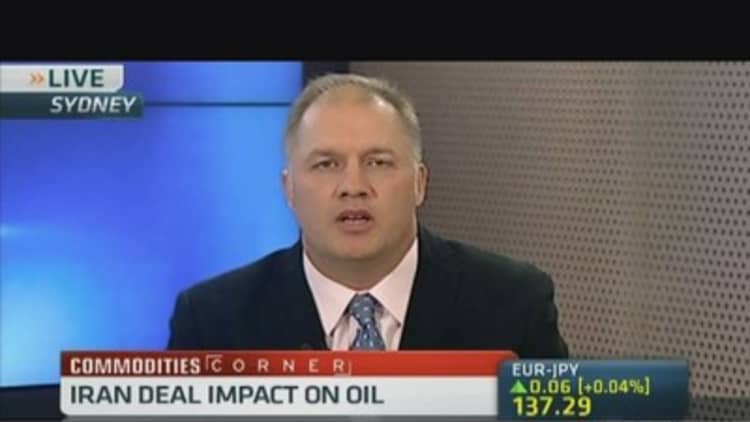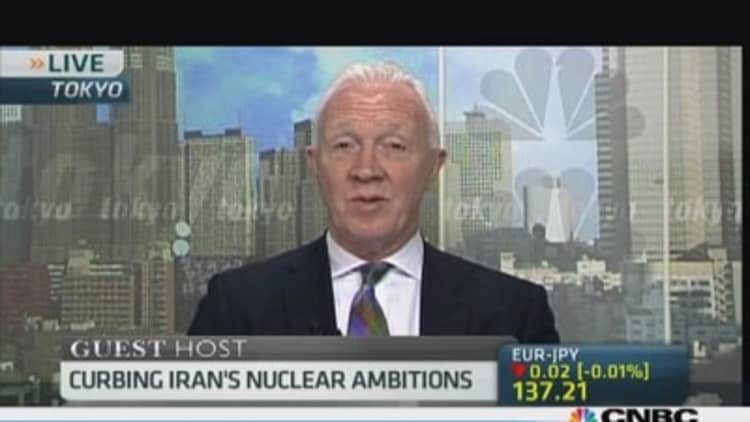
A breakthrough nuclear deal signed between Iran and six other world powers over the weekend has the potential to remove the "Middle East premium" from oil prices, some analysts say.
Brent crude prices fell over $2 from Friday's open to $108.47 in early trading in Asia on Monday, while U.S. crude also slipped 90 cents to $93.64 a barrel, as investors priced in the prospect of Iran, home to one of the world's largest oil and gas reserves, coming back to market.
(Read more: Iran oil, energy sanctions still in force: US)
The deal on Sunday does not immediately end the sanctions on Iran, but is seen by many to symbolize a step towards progress further down the line, which could increase global supply and therefore dampen the price of oil.
"I think we will get a bit of a knee jerk-reaction [to the deal] but I still think that oil will continue to trade lower for some time... the Middle Eastern premium is eroding quite fast," Jonathan Barratt, chief executive officer of Sydney-based commodity research firm Barratt's Bulletin, told CNBC Asia's Squawk Box on Monday.
And if Iranian crude sales are restored, it could threaten some of the major suppliers worldwide, Barratt added.
"It has implications for OPEC and probably also for the U.S. as well. Remember they [the U.S.] are going to be one of the largest producing nations for oil outside of Saudi Arabia and Russia so the implications for supply are certainly there. I think you'll see supply continue to increase if economies do not pick up," he added.
(Read more: Why a nuclear deal would mean oil price falls)
U.S. and E.U. sanctions on Iranian crude sales, which prevent Western energy companies from dealing with Tehran, have been in force since 2006 in an effort to inhibit Iran's nuclear weapons program. Iran's oil output has been dramatically reduced as a result, by around 1.5 million barrels a year, a factor that has helped support strong oil prices in recent years.
Kevin Book, head of the research team at Washington-based research firm ClearView Energy Partners, said if Iran's oil producing capabilities are eventually returned to normal, it could put substantial downward pressure on crude prices.

"The deal opens up the possibility of at least 1 million barrels a day of Iranian crude returning to world markets by the fourth quarter of 2014, as result Brent crude prices could fall to $90 a barrel in this time," he said.
However, other analysts pointed out that Sunday's deal, although seen by many as symbolically important, did not translate to any immediate relief for Iran and there's a chance it may not materialize.
(Read more: Iran curtails nuclear capacity expansion: IAEA)
Negotiations have been fiercely opposed by more hawkish lawmakers in Washington, while the continued threat of an Israeli military attack on Iran also poses a risk to the deal. Meanwhile, even if Iranian supply does return to the market, other stubborn supply headwinds in other major global oil exporting countries, including Libya, Nigeria and Iraq, could also restrict global supply levels.
"What we've seen is two bucks and a bit come off, and that's about perceived geopolitical risk, not about an imminent boost to the supply side, which we are not going to see. There has been no easing of sanctions against crude sales by Iran," said Alastair Newton, senior political analyst at Nomura.
Newton said he believed the deal to be an important step in the right direction, but said there was still a long way to go.
"I do think it's an important step and it's not to be underestimated...[but] there is a long way to go...I do think probably we will get a compromise whereby the sanctions package is passed but not implemented for at least another six months," he added.
(Read more: Iran nuclear talks fail: Where next for oil?)
Guy Stear, head of research for Asia at Societe Generale, told CNBC the deal could have an impact on prices in the medium term, but added that Saudi Arabia could act to limit too much downside.
"The reason the market is bullish is because they see this as an option for improvement in the future. Our analysts say it [the deal] could be worth $5 a barrel so it could get the Brent down to $103, but [a move] below there looks quite improbable," said
"The other thing we tend to think about is how will Saudi Arabia react? If Saudi Arabia thinks more Iranian oil is coming to market, and they think prices are going too low, they may remind the market that they can turn off production as and when they want," he added.
—By CNBC's Katie Holliday: Follow her on Twitter @hollidaykatie


